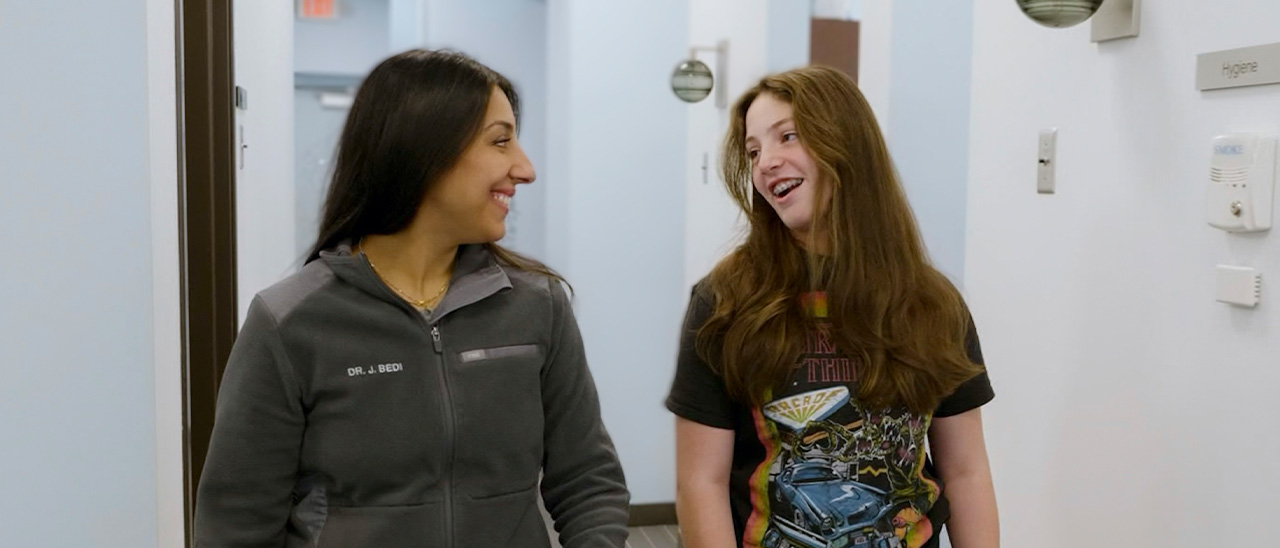
As a parent, ensuring the health and well-being of your child is a top priority, and that includes their dental health. Orthodontic issues, if left untreated, can lead to more significant problems later in life. Identifying the need for early orthodontic treatment can save your child from potential discomfort and complications. That’s why we recommend booking a consultation with our Ann Arbor, MI, orthodontist.
In the meantime, here are 10 signs that indicate your child might be ready for their first orthodontic visit.
1. Crowded or Crooked Teeth
One of the most obvious signs that a child may need orthodontic treatment is crowded or crooked teeth. Crowding occurs when there isn’t enough room in your mouth for all of your teeth, causing them to overlap or twist. Misalignment, on the other hand, may lead to teeth that do not sit straight.
Not only can this affect their smile’s appearance, but crowded teeth are harder to clean properly, increasing the risk of tooth decay, gum disease, and plaque buildup. Our Ann Arbor orthodontist can assess the situation and recommend traditional metal braces or Invisalign® clear aligners, both excellent treatments for straightening teeth.
2. Overbite or Underbite
An overbite occurs when the upper front teeth overlap the lower front teeth significantly. Conversely, an underbite happens when the lower front teeth extend beyond the upper front teeth. Our local orthodontist knows just how both conditions cause problems with chewing, speaking, and even lead to jaw pain. Early orthodontics can correct these bite issues effectively.
3. Early or Late Loss of Baby Teeth
Losing baby teeth too early or too late can affect the alignment of permanent teeth. If your child loses baby teeth prematurely, it may result in the remaining teeth shifting into the empty spaces, causing misalignment. On the other hand, if baby teeth persist longer than they should, they can hinder the eruption of permanent teeth. In either situation, taking your child to see the orthodontist for a thorough examination is beneficial.
4. Mouth Breathing
Children who predominantly breathe through their mouths rather than their noses might develop orthodontic problems. Mouth breathing can affect the growth and development of the jaw and facial bones, potentially leading to malocclusions (bad bites). Pediatric orthodontics can help address these issues and promote proper breathing habits.
5. Difficulty Chewing or Biting
If your child has trouble chewing or biting their food, it could be due to misaligned teeth or jaw problems. Observing how they eat can give you clues about potential orthodontic issues. If they frequently complain of discomfort while eating, it’s worth consulting our orthodontist in Ann Arbor, MI.
6. Thumb Sucking
Prolonged thumb sucking beyond the age of 4 can lead to orthodontic problems. This habit can push the front teeth forward, resulting in an overbite, and can also cause the teeth to become crooked. Early orthodontic evaluation can help mitigate the effects of thumb sucking.
7. Speech Difficulties
Speech problems can sometimes be linked to dental issues. Misaligned teeth or jaws can affect the way your child articulates sounds. If you notice that your child has difficulty pronouncing certain words or sounds, an orthodontic evaluation might be necessary to determine if dental issues are the cause.
8. Teeth Grinding
Teeth grinding, also known as bruxism, can wear down the teeth and cause jaw pain. It’s often a sign of underlying stress or anxiety, but it can also be related to misaligned teeth or bite issues. Metal orthodontic braces and clear aligners can help correct the alignment and reduce the grinding.
9. Jaw Pain or Clicking
If your child frequently complains of jaw pain or you notice a clicking sound when they open or close their mouth, it could indicate a temporomandibular joint (TMJ) disorder. This condition can be exacerbated by misaligned teeth or jaw issues, and orthodontic treatment for kids can help alleviate the symptoms.
10. Inherited Dental Problems
Genetics play a significant role in dental health. If you or your partner had orthodontic issues, there’s a higher likelihood that your child might also need orthodontic treatment. Keeping a close eye on their dental development and seeking an early evaluation can help address problems before they become more severe.
When Should My Child Be Evaluated for Braces?
The American Association of Orthodontists (AAO) recommends that children undergo an orthodontic evaluation around the time they turn 7 years old. At this age, your child will have a mixture of baby and permanent teeth so our orthodontist can see how they are all coming in and if any problems are forming.
Arising issues regarding your child’s oral health should be taken seriously and not ignored in hopes they’ll resolve on their own. Treatable problems are always better corrected while they’re younger, so keep this in mind when considering whether to seek out orthodontics for children.
Contact Enhance Orthodontics Today
Ready to discuss your child’s treatment options? Dr. Jashleen Bedi is proud to serve as your trusted orthodontist in Ann Arbor, MI. To schedule a consultation for your child, please call Enhance Orthodontics at (734) 821-7684. You may also fill out our online contact form and a member of our team will reach out to you soon.
This blog post has been updated.
